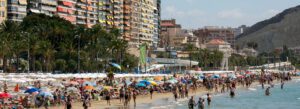Best Cities in Spain to Work and Explore for Digital Nomads
Table of Contents
Madrid, Malaga, Alicante, Murcia, Valencia, and Barcelona are some of the best cities in Spain to work and explore for digital nomads. Below, we’ve explained why Spain has become one of the most preferred countries among digital nomads and startups and why these cities are the best cities in Spain for digital nomads.
Spain for Digital Nomads: Discovering the Perfect City for Remote Work
Spain has become one of the most preferred countries among digital nomads in recent years thanks to its lifestyle and nature. The country provides many advantages and benefits to digital nomads and startups in addition to offering a mesmerizing and peaceful environment. The easily obtainable Spain digital nomad visa, tax reductions, and the opportunity to expand your business circle are only some advantages.
However, not all cities can be considered suitable for digital nomads, freelancers, and startups. There are several matters that should be taken into account before choosing a city. Here are some of them;
- Coworking Spaces
The existence of abundant coworking spaces should be one of the key criteria when choosing a city for remote work in Spain. Due to the nature of their work, remote workers are not bounded to a place. This means they can carry out their work anywhere in the world if they have an internet connection.
The increase in the number of people working with their laptops in the corners of cafes and restaurants proves this situation. However, not every coffee shop or restaurant in Spain might have a stable and fast internet connection and a quiet environment to focus on work.
Indeed, Spanish people consider coffee shops, cafes, and restaurants as social areas. They like to meet up with their friends in these places and enjoy their meals leisurely. For this reason, most of these places don’t provide an internet connection to the customers, and the best cafes and restaurants with Wi-Fi in Spain are in large cities.
As a result, coworking spaces were created as the number of remote workers started to increase. Today, many coworking spaces exist for freelancers and digital nomads in Spain. The best coworking spaces in Spain are the ones in large cities like Madrid, Malaga, Alicante, Murcia, Valencia, and Barcelona.

- Transportation Options
Since remote workers are not bounded to a certain place, they usually like to travel between different cities and discover new places in their leisure time. For this reason, transportation options play an important role in choosing a city for remote workers.
Spain is a highly developed country in terms of transportation. The country has many airports, but railways are the best transportation options for digital nomads in Spain, thanks to the wide network and high-speed trains.
The railway network of Spain covers almost all cities; however, you may have to rent a car if you want to visit small towns and villages. But you don’t have to worry. The highways throughout Spain also ensure safe and fast travel.
- Accommodation Options
It’s very easy to find accommodation for digital nomads in Spain who want to travel often. There are many hotels and resorts across the country suitable for every budget. Short-term rental apartments and houses are also abundant in large cities.
On the other hand, expats living in Spain who have decided to settle in permanently should prefer to buy a property for a more comfortable and affordable living in the long term.

- Cost of Living
Since digital nomads earn their income outside of Spain, the cost of living becomes another key factor when choosing a city. The cost of living in Spain is relatively lower than in many other European Union countries. Not only the accommodation options but also the expenses for basic needs like food, utilities, and transportation are cheaper.
However, it should be noted that the cost of living in Spain for digital nomads in metropolitan cities and popular tourist areas might be higher than in the rest of Spain.
- Economical Structure
The city’s economic structure especially plays an important role for startups and freelancers who want to expand their business circle. Freelancers who carry out their businesses through connections with other businesses should prefer large cities. Large cities usually have a more balanced economic structure and accommodate many businesses from all sectors.
Therefore, freelancers can easily meet many other business owners and freelancers from the same sector and expand their business circle in large cities. On the other hand, startups may prefer smaller cities to benefit from the lack of rivalry. So, freelancers and startups should thoroughly research cities’ economic structure before deciding.
- Activities and Attractions
The Spanish lifestyle’s activities and attractions are another reason why so many digital nomads want to settle in Spain. These activities and attractions diversify according to the city. For instance, Madrid is home to countless attractions, including museums, historical buildings, entertainment venues, amusement parks, and more, as you would expect from a capital city. However, you would have to travel for 4.5 hours at least to reach crystal clear sea and sandy beaches.
On the other hand, you can enjoy all kinds of water sports and outdoor events in the cities and towns on the southern coast of Spain. Therefore, digital nomads should think carefully about what type of lifestyle they want before making a decision. Nevertheless, Spain has a mesmerizing nature and a colorful lifestyle. In addition, you can find some of the best outdoor working spaces in Spain for digital nomads.
- Digital Nomad Community
The existence of a digital nomad community is especially important for people who can’t speak Spanish. Spain has an expat-friendly environment. But, it might be hard to get around for digital nomads who have just moved to Spain. In these kinds of situations, having a friend who can speak your native language is priceless.
Today, Spain’s digital nomad community is growing day by day, thanks to the approval of digital nomad visas. Large cities like Madrid, Barcelona, and Valencia and tourist hotspots like Malaga, Alicante, and Murcia have a large and diverse digital nomad community.
What Are the Best Cities in Spain for Digital Nomads?
As we’ve briefly mentioned above, the best cities in Spain for freelancers and digital nomads are Madrid, Malaga, Alicante, Barcelona, Murcia, and Valencia. Here’s why;
- Madrid
Madrid is the capital city of Spain and certainly is one of the best cities in Spain in many aspects. The city has all kinds of amenities you can think of, including museums, entertainment venues, theatres, restaurants, pubs, libraries, coworking spaces, and so on. In Madrid, digital nomads and freelancers can comfortably carry out their work and expand their business circle at the same time. However, the capital is one of the most costly cities to live in Spain.

- Málaga
Although it’s not as popular as Madrid, Malaga is also one of the tourist hotspots in Spain. Referred as the capital of Costa del Sol, Malaga is a coastal city with a colorful lifestyle and buoyant economy.
Its popularity has started to grow in the last few decades, which means there is still room for growth in Malaga. Therefore, it can be considered one of the best cities in Spain for startups. In addition, Malaga is one of the cheapest popular cities in Spain.
- Alicante
Alicante is a popular holiday resort in the Costa Blanca region of Spain. The city offers a comfortable, colorful lifestyle, a rich cultural heritage, and a captivating natural environment. The coastal city is attracting more and more attention from digital nomads and freelancers thanks to its popularity as a holiday destination. In addition, the city offers comfortable living conditions to digital nomad workers at a relatively lower cost.

- Barcelona
Barcelona is also one of the best cities in Spain for remote work, with many coworking spaces, a nice transportation network, a stable internet connection, and a large digital nomad community. Known as Catalonia’s capital, Barcelona also has a rich history. There are plenty of sights to discover for digital nomads and tourists. However, it should be noted that Barcelona is also one of the most costly cities to live in Spain.
- Murcia
Murcia is a relatively unknown coastal city located in southeastern Spain. Yet, the city has a rich history going back as far as Roman times and a natural beauty that won’t lose to popular holiday resorts.
It’s also one of the cheapest among Spain’s holiday destinations. The only downside of Murcia for digital nomads might be the shortage of coworking spaces compared to larger cities. However, renting a pocket Wi-Fi device at very affordable prices is possible.

- Valencia
Valencia is also one of the most popular and largest cities in Spain. The developed city offers all kinds of amenities and services a digital nomad may need in daily life. In addition, the city has a rich cultural background and beautiful nature as well.
The coastal city is suitable for living throughout the year, but you should expect it to be more crowded during peak seasons. Also, you should be aware that the cost of living in Valencia is relatively higher compared to small towns.
What Is the Digital Nomad Visa Process for Spain?
Now that you’ve decided where to go, all that’s left to do is get your Spanish digital nomad visa. Acquiring a Spanish digital nomad visa is easier than getting other types of visas in Spain. The application process concludes in a relatively short time if all application conditions are met.
There are two ways to apply for a digital nomad visa in Spain. The first way is to apply from the Spanish consulate in your country. The second way is applying for it in Spain after entering the country with a tourist visa. Either way, the required documents must be thorough for a smooth application process.
You can contact our legal advisors without hesitation to get detailed information and on-point consultation on how to get a digital nomad visa in Spain. We’re only a phone call away!



